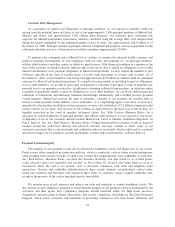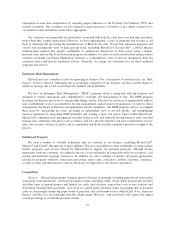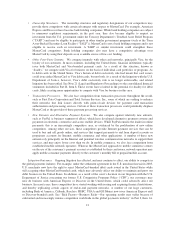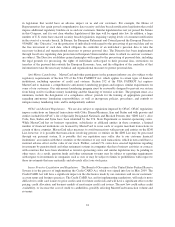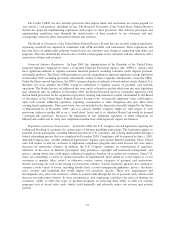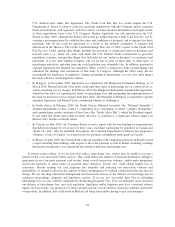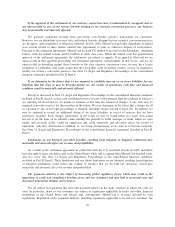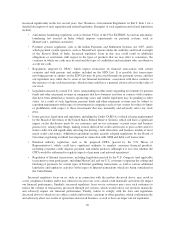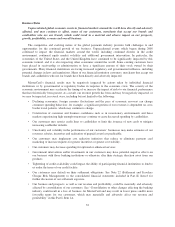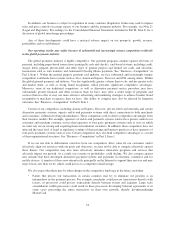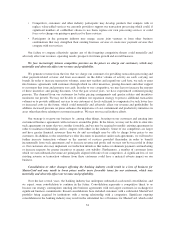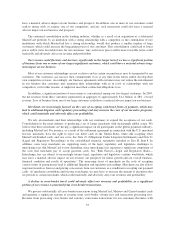MasterCard 2009 Annual Report Download - page 37
Download and view the complete annual report
Please find page 37 of the 2009 MasterCard annual report below. You can navigate through the pages in the report by either clicking on the pages listed below, or by using the keyword search tool below to find specific information within the annual report.• In the United States, the Department of Justice and certain State Attorney Generals have issued
information requests and demands to MasterCard (and Visa) concerning points of sale acceptance rules
and interchange setting practices.
• In the United Kingdom, in February 2007, the Office of Fair Trading commenced a new investigation of
our current U.K. credit card interchange fees and so-called “immediate debit” cards to determine
whether such fees contravene U.K. and European Union competition law.
• In Poland, the Polish Office for Protection of Competition and Consumers issued a decision that our
interchange fees are unlawful under Polish competition law, and imposed fines on our licensed financial
institutions—the decision was then reversed and all parties are appealing.
• In Hungary, MasterCard Europe is appealing the Hungarian Competition Authority December 2009
decision ruling that MasterCard Europe’s historic domestic interchange fees violate Hungarian
competition law and fining MasterCard Europe approximately US $2,600,000.
• In Italy, in July 2009, the Italian Competition Authority commenced a proceeding against MasterCard
and a number of its customers concerning MasterCard Europe’s Italian domestic interchange fees.
• In Australia, the Reserve Bank of Australia enacted regulations in 2002 (which have been subsequently
reviewed and not withdrawn) controlling the costs that can be considered in setting interchange fees for
four-party payment card systems such as ours.
• In South Africa, in December 2008, a special body created by the South Africa Competition
Commission published a non-binding report (under active consideration by South African regulators)
recommending, among other things, having an independent forum under regulatory control set payment
card interchange fees and modifications to payment systems’ (including MasterCard’s) respective
“honor all cards” rules.
• In Germany, in January 2006, a German retailers association filed a complaint with the German Federal
Cartel Office in Germany alleging that our German domestic interchange fees are not transparent to
merchants and include so called “extraneous costs.”
• In Canada, in July 2009 the Canadian Competition Bureau informed MasterCard that it intends to
review MasterCard’s interchange fees and related rules, such as the “honor all cards” and “no
surcharge” rules.
Interchange fees and/or related practices (such as the “honor all cards” rule) are also being reviewed in a
number of other jurisdictions, including Belgium, Brazil, Colombia, Czech Republic, Estonia, France, Israel,
Mexico, the Netherlands, Switzerland, Turkey and Venezuela. We believe that regulators are increasingly
adopting a coordinated approach to interchange matters and, as a result, developments in any one jurisdiction
may influence regulators’ approach to interchange fees in other jurisdictions.
In addition to regulatory action, merchants are seeking to reduce interchange fees through litigation. In the
United States, merchants have filed approximately 50 class action or individual suits alleging that MasterCard’s
interchange fees and acceptance rules violate federal antitrust laws. These suits allege, among other things, that
our purported setting of interchange fees constitutes horizontal price-fixing between and among MasterCard and
its member banks, and MasterCard, Visa and their member banks in violation of Section 1 of the Sherman Act,
which prohibits contracts, combinations or conspiracies that unreasonably restrain trade. The suits seek treble
damages, attorneys’ fees and injunctive relief. See Note 21 (Legal and Regulatory Proceedings) to the
consolidated financial statements included in Part II, Item 8 for more details regarding the allegations contained
in these complaints and the status of these proceedings.
Interchange fees also have been the topic of increased legislative interest. For example:
• In the United States, in June 2009, the “Credit Card Fair Fee Act” was introduced in the U.S. House of
Representatives. This legislation seeks to regulate interchange by allowing merchants to collectively
seek to lower their payment card acceptance costs. Such collective actions would be exempt from the
27



